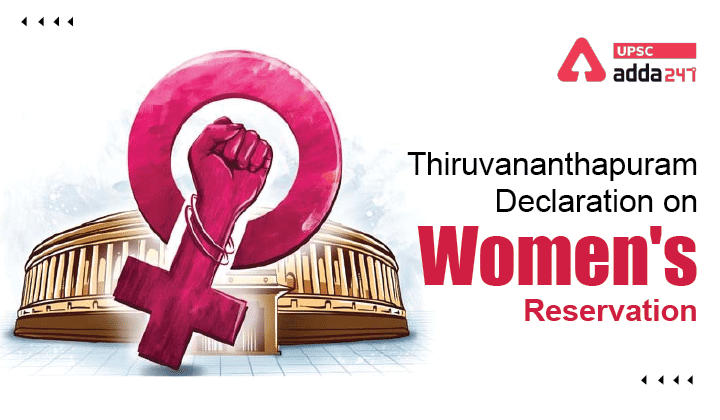Table of Contents
Thiruvananthapuram Declaration UPCS: Relevance
- GS 2: Parliament and State legislatures—structure, functioning, conduct of business, powers & privileges and issues arising out of these.
Thiruvananthapuram Declaration: Context
- Recently, Kerala legislative assembly hosted the first National Women Legislators’ Conference and has adopted Thiruvananthapuram Declaration on women’s reservation.
National Women Legislators’ Conference: Key points
- The conference demanded immediate steps to ensure the passage of the Women’s Reservation Bill which envisages 33% reservation for women in the Lok Sabha and State legislatures.
- The Thiruvananthapuram Declaration lamented the trajectory of the Bill, which has been pending for 26 years, as a sullied blot on the democratic values and legislative traditions of the country.
- The resolution called upon all political organisations, Union government and parliamentarians to take immediate steps for the passage of the long-standing bill.
Constitution (One Hundred and Eighth Amendment) Bill, 2008
- The Constitution (One Hundred and Eighth Amendment) Bill, 2008 seeks to reserve one-third of all seats for women in the Lok Sabha and the state legislative assemblies.
- The minister pointed out that the bill could not be passed due to opposition from regional parties.
- The Bill envisages 33 per cent reservation for women in the legislature. It has been pending in the Lok Sabha for the last 26 years.
Women representation in Parliament
- In the last general election, 78 women were elected to the Lok Sabha even as the reservation Bill was pending legislation.
- Currently, India ranks 148th in the international rankings for women’s representation in the legislature.
Defamatory remarks against women
- Another resolution adopted in the conference called for a legislation to curb defamatory remarks against women.
- According to the resolution, it has come to a stage where even senior women politicians are being defamed on social media.
- The resolution called for a comprehensive legislation that could be implemented across the country to curb intimidation, abuse, defamatory statements and anti-feminist behaviour through social media.
Read current affairs for UPSC





 TSPSC Group 1 Question Paper 2024, Downl...
TSPSC Group 1 Question Paper 2024, Downl...
 TSPSC Group 1 Answer key 2024 Out, Downl...
TSPSC Group 1 Answer key 2024 Out, Downl...
 UPSC Prelims 2024 Question Paper, Downlo...
UPSC Prelims 2024 Question Paper, Downlo...




